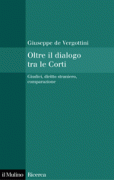Oltre il dialogo tra le Corti

Constitutions and treaties have facilitated the creation of a common cultural space in which the needs shared by people, especially in the protection of human rights, tend to have similar responses by legislators and judges. In particular, there is a widespread belief that constitutional courts and international ones talk to each other in order to experience the same problems common solutions. The book aims to show that while there is a dialogue between state courts and courts of Luxembourg, Strasbourg and the Inter-American Court of Human Rights, the same can not be said of the relationship between state courts. Not only that. It also intends to highlight how the unfounded belief that dialogue is everywhere accompanied by the use of comparison. In fact, the author seeks to show how the so-called dialogue is the recourse to comparative law are likely to result in two myths, making it the nearest and the invalidity of some of the most popular theory of contemporary legal literature.